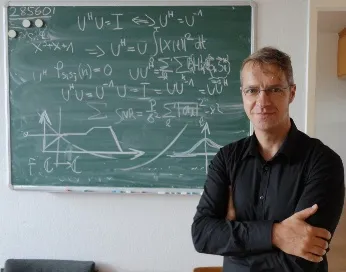Holger Boche
- Phone: +49 (89) 289 - 23240
- Room: 0104.04.408
- boche@tum.de
Research Topics
Theory of Wireless Networks
- Network Information Theory, Network Coding
- Queueing Theory
- QoS-Tradeoff in Wireless Networks
- Scheduling, Routing, Resource Allocation
- Fairness Theory
- Complexity
- Ultra Wideband Systems
- Multiantenna Systems
- Multi-Carrier Systems
- Feedback Design in Wireless Networks
Applied Mathematics
- Probability theory, Queuing theory
- Banach Algebra and operator theory
- Optimization theory, Game theory
- Complex function theory
- Factorization theory of matrix functions
- Quantum Information Theory
Technical Report
"Technology Radar Edition III/2010, Feature Paper: Next Generation Mobile Networks -- (R)evolution in Mobile Communications" PD
Projects
- Characterization of short term stability region of multiple access and broadcast channel
- Delay-limited capacity
- Complete axiomatic theory of interference balancing in multi-user systems
- Kullback-Leibler-Distance and Perron root
- Information theory for operator channels
- Spectral factorization for Disk Algebra
- Wiener Filter, Wiener Algebra and BIBO-stability
- Mapping properties of outer factorization and continuity theory for analytic functions
- Duality theory of Gaussian MIMO broadcast and multiple access channel
- Convex supportable QoS-regionInformation theory for UWBFairness theory for resource allocation
- Rule of inequalities in information theory (A systematical approach to gain central inequalities should be discussed
-- Duality theory of Gaussian MIMO broadcast and multiple access channel
-- Kullback-Leibler-Distance and Perron root
-- Fairness theory for resource allocation - Super efficient estimators, super efficient data compression and information theory (You can beat the Cramer-Rao-Bound for parameter sets of Lebesque measure zero)
- Stability region for Aloa
Project Proposals
(Interested student should contact Prof. H. Boche)
- Solution of Shannon´s problem of monotonicity of entropy (Lately the problem could be solved positively with a very interesting proof technique. This technique could also be used for other problems and is an challenging topic for advanced and PhD students)
